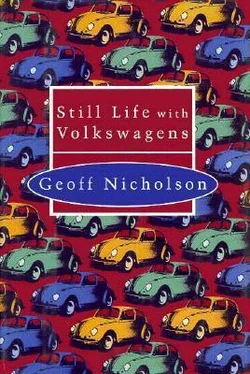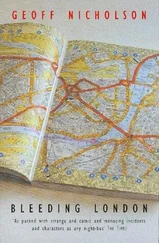“No,” Barry admits.
“When Adolf Hitler conceived the idea of the autobahn that’s not what he had in mind at all. He saw long straight fast motorways uncluttered by riff raff and deviants.”
“What?” says Barry.
“You’re a good citizen, aren’t you Barry? You’re law abiding, moral, politically middle of the road, not sexually or socially deviant. You’re male and you’re white.”
“Well, to an extent,” Barry stutters.
“Why deny it Barry? Why be ashamed? You don’t want the world left in the hands of extremists and perverts, do you? Of course you don’t. In your heart of hearts you’re just like me, just like us. You know that Adolf Hitler was right.”
“About motorways?”
“About everything. He designed the Beetle didn’t he?”
“Well, he had a certain amount of help from Ferdinand Porsche, not to say the British Army.”
“Of course he did. We all need a little help, Barry. I need yours. You need mine.”
Barry is about to deny this vehemently, but there’s no stopping the stranger now. He continues, “I have a dream Barry, a vision if you like, and you could be part of it.”
“What sort of vision?” Barry asks, and immediately wishes he hadn’t.
“Well,” says the stranger, “I see us as a band of supermen, roaming this great country of ours in chariots of fire, by which of course I mean Volkswagen Beetles. We would be dominant. We would be loved, feared, worshipped. We would be as Gods, Barry. Or should I call you Ishmael?”
“No, don’t call me Ishmael!” Barry insists. “How do you even know about Ishmael?”
“I know all about you Barry. What do you say? Do you want to be a superman?”
Barry prides himself on being slow to anger, but a strange milkshake of emotions is frothing inside him. Its ingredients include pain, annoyance, anger, disgust. He looks the stranger right between the eyes and says, “You’re one of those bloody neo-Nazis, aren’t you?”
Phelan smiles condescendingly as if to indicate that Barry’s response is pathetic and childish. There’s nothing neo about me,” he says.
“Get out of my Beetle,” Barry says, white and trembling with anger.
The man shrugs and gets out immediately and quite willingly. He closes the door gently behind him. He moves round to the driver’s side of the car. He starts to walk away, but when he’s twenty yards away from Barry he turns and says, “You can take the Nazi out of the Volkswagen, but can you take the Volkswagen out of the Nazi?”
After he’s gone, it takes Barry quite a while to come to the conclusion that this is an almost entirely meaningless remark.
♦
He kneels in the dark beside the big iron bed. His ankles, wrists and throat are ringed with studded leather. A latticework of steel chains connects these points of restraint. Their metallic rattle stirs with his every movement. The links touch his body as coldly as a mistress.
His body is tied in a sheath of black and red leather, a construction of straps and buckles, thongs and studs that encloses and holds him, yet leaves him more vulnerable, more truly naked, than ever. Genitals and buttocks are left bare. Access is guaranteed. There will be no resistance. His body, where it shows, is marked with small cuts, bruises, ‘love bites’. Around his biceps are swastika armbands.
The room is stiflingly hot and smells of rubber, metal, hot oil, sweat. It is swathed in patchy candlelight. The candles flicker in twisted, wrought iron holders, and wax decays and carves itself into white, brittle stalagmites. All the walls are draped thick with flags. Some bear German eagles, some death’s heads, some crisscrossed with swastikas. The flags creep over the ceiling and hang over the bed like a red and black canopy. The rest of the room is decorated with swords, guns, axes, chalices, examples of Nazi uniform. There is an oak table into which SS flashes have been carved, then a series of exhibits have been laid out on its surface; rubber truncheons, riding crops, canes, cords, gas masks, dildos made of wood and metal and ivory.
Suddenly he knows she has entered the room. He knows even before he hears her footsteps, loud and precise, militaristic and decadent. He doesn’t turn round, he doesn’t need to. He knows the games, the rules, the costume. He knows she will be dressed immaculately in Hitlerian kitsch, fancy dress that is sexier and more exotic than any real uniform; some baroque combination of knee boots and breeches, bare breasts, braiding, a service dagger.
She is approaching. When she is near enough she prods his buttocks with the shiny tip of her right boot. She moves it into more intimate space, pushes in between his thighs, forcing his legs open.
“Well, Phelan,” she says, “what shall we do with you today?”
It is a rhetorical question. She pulls a knotted silk cord that dangles at the side of the bed, and one of the ‘walls’ of flags draws back to reveal a small anteroom. It is the size of, say, a domestic garage, and it contains, spotlit and on a raised dais, a silkily black Volkswagen cabriolet. More properly it should be called a Kraft durch Freudewagen, a Strength Through Joy car, since this car dates from the model’s very earliest days. In fact, this is a vehicle once owned and driven by a Gestapo officer called Hans Krauss, a personal friend of Adolf Hitler, who received the car in exchange for certain special services rendered to the Führer.
Phelan is pulled to his feet and led across the room by the chain at his neck. He stands briefly beside the car, like a driver about to plunge into a dark, bottomless ocean. She pushes him down onto the front passenger seat, onto the very spot where he knows a murderous Gestapo officer once planted his taut, black-uniformed buttocks. The thought brings him an orgasm rather sooner than he would have liked.
Nevertheless, he has to say, “Thank you Miss Renata. Thank you so much.”
♦
A yellow Volkswagen with a demolished front end is delivered by tow truck to Fat Volkz Inc. The driver of the truck manoeuvres and unhitches the Volkswagen so that it stands forlorn and skewed on a patch of gravel adjacent to the workshops. The owner of the car has been sitting in the cab of the truck, but now she descends. She is no longer dressed in Nazi gear, although her black leather jacket, her leggings and her black high heels still look mean and sexy enough for most people.
Les surveys the damage to the Volkswagen. It is a terrible, squashed, tangled mess. He feels quite proud of himself for having caused it. On the other hand, he knows it’s going to take a hell of a lot of work to get it back into shape.
“Hello Les,” says the woman.
Les is quite used to having strangers address him by his first name. He says hello in return.
“Why did you do it, Les?” she asks.
“Do what?”
“Reverse into me?”
“I don’t know what you’re talking about.”
“Oh. Come on Les.”
The way she talks suggests a friendliness, a familiarity that he doesn’t understand. He’s pretty sure he’s never met her before. He’d certainly have remembered her if she’d been one of his previous customers.
“Do I know you?” he asks.
“I’m Renata Caswell,” she says.
He considers the name for a moment, and it does sound ever so vaguely familiar, but he can’t place it and he remains none the wiser.
“You seen anything of your friend Ishmael?” she asks.
Ishmael. The very name hurts him. He remembers a time when his life was entangled with that of Ishmael. They drove too fast. They drank lager. They fire-bombed stuck up twats in Range Rovers. It all seems a long time ago, but not quite long enough.
“I was the journalist who finally exposed Ishmael,” she tells Les. “I’m the one who stopped him turning into a complete little Hitler.”
Читать дальше












